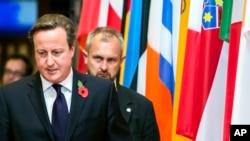Europe is waiting with unease for the next steps of British Prime Minister David Cameron, after the electoral victory of his euro-skeptic conservative party.
For now, questions abound in the European Union as to what it will take to keep Britain in the 28-nation bloc and just how far Europeans are willing to compromise so this happens.
German local elections usually do not get much attention elsewhere in Europe. But Sunday’s gains by a euro-skeptic party in the city-state of Bremen made news here in France. That is because of a much bigger win in Britain last week by Prime Minister David Cameron’s Conservative Party.
With Cameron’s promises to hold a referendum by 2017 on Britain’s membership to the European Union, euro-skepticism and questions about the EU’s future are renewed concerns.
In Brussels, the two top EU chiefs: Commission President Jean-Claude Juncker and EU President Donald Tusk, say they are willing to listen and negotiate with Britain. French President Francois Hollande also says he is willing to discuss Britain’s place in the EU with Cameron.
But Hollande says that while it is legitimate to talk about British aspirations, there are rules in Europe - including the free circulation of people, which Cameron wants to limit - that members must stick by.
Before the 2017 referendum, Cameron says he wants to push for reforms within the EU and renegotiate the terms of British membership. Right now, says analyst Sonia Piedrafita of the Brussels-based Center for European Policy Studies, the Europeans are waiting for details.
“Because so far, the conservative government is not clear at all about what [Cameron] means when he’s talking about a reform of the European Union and what his plans are for a referendum on that topic,” says Piedrafita.
The repercussions may be far-reaching. Britain is hardly the only euro-skeptic country. In France, the far-right National Front is polling strongly ahead of presidential elections in 2017 - partly on its platform to exit the EU.
In an interview on French radio, Front leader Marine Le Pen says the European Union is making all the decisions for France - on issues ranging from immigration to the economy.
Analyst Piedrafita says if Britain pushes for radical EU reforms, it will play into the hands of euro-skeptics like the Front. But positive ones might actually boost European public support for Brussels. Reforms might also persuade British voters to stay in the bloc.
The EU has weathered the specter of an exit before - most recently with Greece’s talk of a “Grexit.” But a “Brexit,” as it is being called, would be a much bigger psychological and economic setback, experts say.




